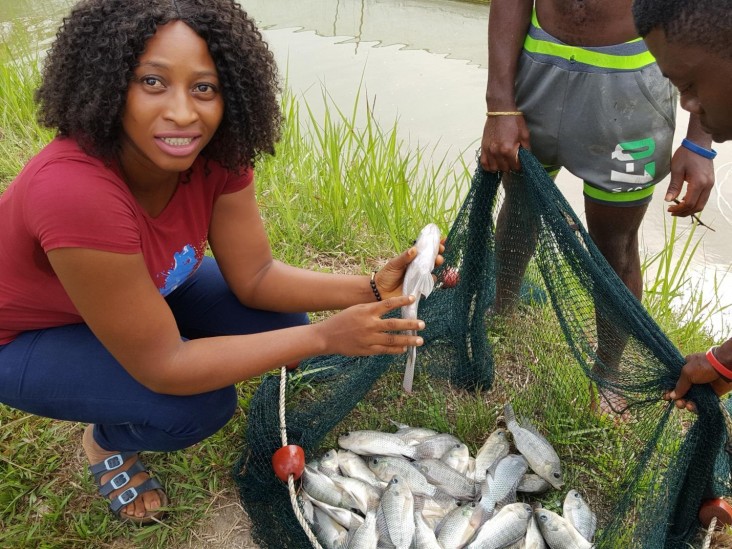Speeches Shim

Ousmane Condé, USAID
When World Fish began implementing the USAID-funded Feed the Future Scaling Up Aquaculture Production (SAP) project in Sierra Leone in 2015, inland fish-farming for business was a relatively new concept in the country.
In Sierra Leone, malnutrition rates are higher in the poorest and most food insecure districts of the country. This reality prompted the focus of the project to the inland Tonkolili district located in the northern province of Sierra Leone, one of the poorest and most nutritionally insecure district especially for women, girls and children under- 5 years .
The Scaling Up Aquaculture (SAP )project, which runs until March 2019, is designed to improve nutrition levels and give small-scale farmers the skills and knowledge they need to operate profitable aquaculture businesses as part of USAID’s efforts to help communities in Sierra Leone assume responsibility for managing and financing their own resilience and food security challenges.
On my recent field trip to Tonkolili, I discovered that World Fish had renovated the old government owned hatchery located in Makali as one of their priorities to increase fish production. Today, this hatchery serves as a training and research center and also as a supply house for reliable supply of tilapia fingerlings in the district.
Fish farming in the district has huge potential because of the ideal farming conditions of the region. When the SAP project started, fish farming yields were very low. The project imported tilapia from Burkina Faso and Ivory Coast to boost productivity. The result is very promising! - during the first fish harvest the project over saw in Tonkolili in 2016, some female fish farmers earned up to L2,000, 000 ($238), a significant amount of money for a small-scale farmer in Sierra Leone.
“Although inland fish-farming has been practiced here for decades, the concept of it becoming a business is new to the people. So, it will take time for them to fully engage in it” Dr. Sunil Siriwardena, Chief of Party of World Fish in Sierra Leone told me.
In Makumbu village I learned that before the SAP project men used to make decisions on how collective fishing resources should be managed. Following efforts by the SAP project to build female fish farmers empowerment, women now own equal number of fish ponds as men and are now engaging in collective actions.
“It is very encouraging that we are empowered because women are more involved in agricultural activities than men in our communities and they should therefore get more benefits” Hawa Sesay, a female leader in Makumbu told me.
She said women spend more time and do more farm work than men. At the same time they are expected to take care of the children and prepare food for the family. Yet men generally had more access to information and inputs and led farm management and income use decisions.
After over three years of implementation, the SAP project has trained over 200 small-scale farmers including over 50 women in basic fish farming techniques and has helped to construct over 171 fish ponds across Tonkolili district. As a result, the new fish farming practices have reached 24 other communities in the district and is now making supplementary revenue for over 170 households with an average of seven people per household.

Comment
Make a general inquiry or suggest an improvement.